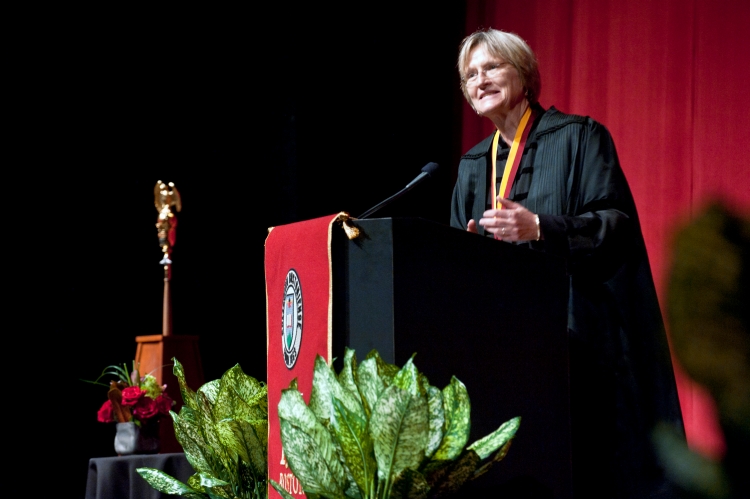
By
Harvard University President Drew Gilpin Faust offered an expansive look at the role of scholarship and the American research university last week, when she delivered the inaugural lecture of the Boston College Sesquicentennial Speakers Series and received the first Sesquicentennial Medal.
The lecture, held in Robsham Theater, was the second of two events this month in the University’s Sesquicentennial Celebration. The symposium “Education and Its Role in Democratic Societies” was held Oct. 5 in the Yawkey Athletics Center Murray Room.
Faust, who was welcomed by President William P. Leahy, SJ, and Board of Trustees Chair Kathleen McGillycuddy, NC ’71, offered a vivid portrait of the vital purpose and critical role of American research universities in a world rapidly changing as a result of globalization and technological advances.
The remarks by Faust, a renowned Civil War historian, followed in a tradition born nearly 50 years ago, when then-Harvard President Nathan Pusey traveled the five miles from Harvard Square to Chestnut Hill to speak at Boston College’s Centennial Anniversary.
Faust touched on Pusey’s view that universities should not simply serve as a means to professional training, but “build value into our common life,” she said, quoting her predecessor’s remarks a half-century ago.
In times of economic uncertainty, Faust said, universities need to resist pressure to narrowly define the purpose of a college education largely as a route to financial success. “By focusing on education exclusively as an engine of material prosperity, we risk distorting and even undermining all a university should and must be. We cannot let our need to make a living overwhelm our aspiration to lead a life worth living.”
At the core of the university is scholarship, Faust noted, which takes many forms and pathways, some planned and others unplanned.
“At their best, universities maintain a creative tension, tackling the purposeful and the apparently pointless with equal delight – from the eating habits of the vampire squid to the nature of empire to the technology for optimal vaccine delivery,” said Faust. “We must continue to nurture that creative tension. We must value it and encourage it, and assure its place in the structures and modes of academic inquiry and in our understanding of the university’s fundamental purposes. Because sometimes the best path to short-term goals is through the unplanned byways of the long-term perspective.”
Faust acknowledged Boston College’s place within the Catholic intellectual tradition, citing Professor of Theology Fr. Michael Himes’ eloquent homily at the Sesquicentennial Mass at Fenway Park last month, where he observed, “Education is the process through which we become more fully human, and also more like God.”
Faust added, “It is a welcome perspective in a world where the measure of things so often trumps the meaning of things, and the practical, immediate uses of knowledge so often overshadow the larger, more enduring purposes of education.”
Faust pointed out that the leaders of Boston College and Harvard often sparred in a clash between the traditionalist approach to moral education and an emerging emphasis on an elective system centered on the desires of individual students.
She cited Fr. Timothy Brosnahan, SJ, BC’s president from 1894 to 1898, who derided the elective system as a disruptive force. In contrast, Boston College, founded in 1863 to educate the sons of Irish immigrants, “undertakes to mold the character of the boy,” he said.
Hand in hand with the development of individual character came the University’s dedication to the pursuit of larger truths, she said.
“The Jesuit tradition has been deeply committed to this work, to the principle that an education is not just about knowledge, but also about how to live a life,” Faust said. “Boston College has for 150 years sustained this tradition, founded in empathy, outreach, and service.”
Faust often recalled the tumult and tragedy that laced America in 1863, when Boston College was founded in Boston’s South End. That same year, the Civil War battlefield at Antietam was the site of the bloodiest day in US history, claiming 6,500 lives. Nearly 30,000 were wounded — a staggering tally roughly equal to the number of young men and women who apply annually to both BC and Harvard.
Survivors of that day and the war would return home and many entered institutions such as Harvard and Boston College, seeking both answers and the prospect of a better life.
Today, universities offer the same opportunities to a global audience in an increasingly complex world.
“We seek to serve talented students of every race, gender, ethnicity – as well as those from even the most limited financial circumstances. In this realm, our challenge now is to be able to deliver on the promise that education represents and to make sure that it is available and affordable. This may be a difficult goal to achieve, but it is not a difficult one to define.”



